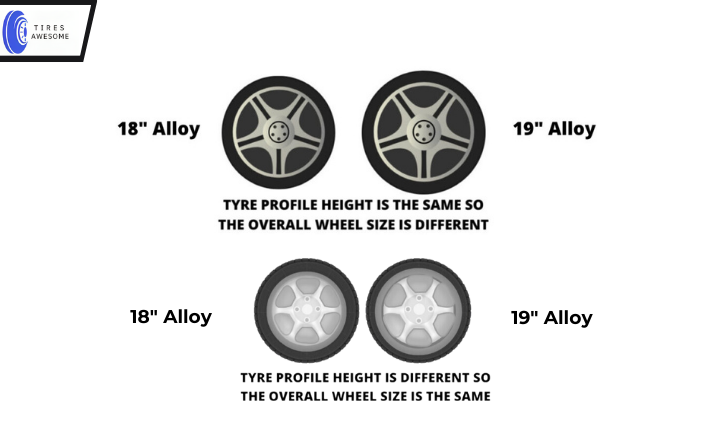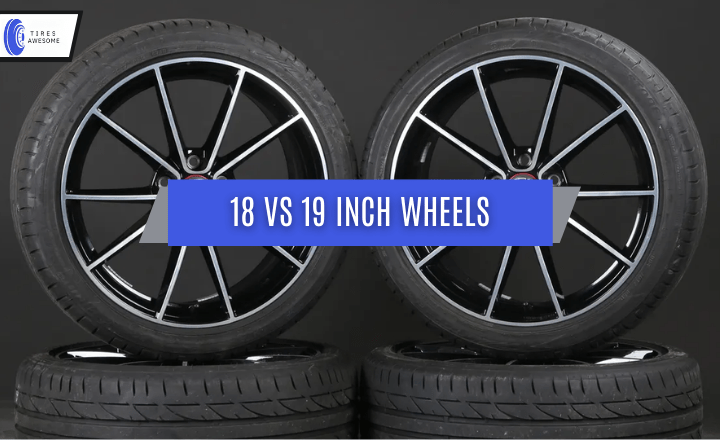The debate about 18 vs 19 inch wheels has divided the automotive world. Some argue that bigger wheels are always better, while others claim that smaller wheels provide a smoother ride. As an expert, I’ll guide you about which wheel is best for your tires.
In today’s guide, I will explain everything you need to know about 18 inch vs 19 inch wheels, from their impact on ride quality and fuel efficiency to how they enhance your vehicle’s appearance.
Which is better 18 inch or 19 inch wheels?
The debate between 18-inch and 19-inch wheels has its pros and cons. The 18-inch wheels are touted for being lighter and more affordable than their larger counterparts, making them a popular choice among car enthusiasts looking for a balance between performance and cost. Other than that if we talk about 19-inch wheels, these offer a more aggressive look and can enhance the overall visual appeal of a vehicle.
One interesting trend that has emerged in recent years is the evolution of 200 TW (treadwear) tires. These high-performance tires are designed to provide exceptional grip on both dry and wet surfaces while maintaining longevity. As technology has advanced, these tires have become more versatile, offering improved handling capabilities without sacrificing tread life.
This development has reshaped the conversation around wheel size, as it allows drivers to maximize their performance potential regardless of whether they opt for 18 or 19-inch wheels.
18 vs 19 Inch Wheels: Detailed Analysis
Smaller wheels provide a more pleasant and comfortable ride due to their increased tire sidewall, which effectively absorbs shocks. Larger wheels with lower-profile tires result in a harsher ride as they directly transfer bumps into the cabin.
| 18” Alloy Wheels | 19” Alloy Wheels |
| Higher profile tires | Lower profile tires |
| Less sporty looking | Better aesthetics |
| More comfortable | Better handling |
| Less road noise | More road noise |
| Less expensive | More expensive |
Your wheel’s size directly affects your steering’s precision and responsiveness. Bigger wheels minimize flex in the sidewalls, resulting in better feedback from the road. Smaller wheels offer a smoother ride as they absorb bumps and imperfections on the road.

Larger wheels excel in providing increased grip during cornering due to their wider tire contact patch. This enhances stability and traction when maneuvering through tight turns or bends.
Comfort
Bigger wheels improve performance because they have less tire sidewall, making the ride stiffer. 18-inch wheels give a smoother and more comfortable driving experience. If you often drive on rough roads, choosing 18-inch wheels is better because they protect against potholes and bumps. If you prioritize comfort over sportiness or performance, 18-inch wheels are a good balance between style and smoothness.
Appearance
Larger 19-inch wheels with an extra inch in diameter fill the wheel wells and create a more substantial presence on the road. The larger size allows for bigger brakes, resulting in improved braking performance that enhances safety and adds to its overall appeal.

18-inch wheels may have less visual impact because their taller sidewalls provide increased cushioning against rough roads, ensuring a smoother and more comfortable driving experience.
Fuel Consumption
Smaller wheels have a lighter weight, reducing rotational mass and improving efficiency. Larger wheels increase rolling resistance, necessitating more engine power to maintain speed. The impact of wheel size on fuel consumption is relatively minor compared to factors such as driving habits or aerodynamics.
Larger wheels may decrease efficiency; advancements in tire technology can alleviate this drawback. Manufacturers have developed low-rolling resistance tires for more giant rims, mitigating some associated fuel economy concerns.
| 225/40 R18 Tires | 225/35 R19 Tires | Difference | |
| Goodyear Eagle F1 Asymmetric 5 Y | D | D | None |
| Pirelli Cinturato P7 Y | B | C | 1 Grade |
| Michelin Primacy 4+ Y | C | C | None |
| Continental EcoContact 6 Y | A | A | None |
| Bridgestone Turanza T005 Y | B | B | None |
| Dunlop SP Sport Maxx RT2 Y | C | C | None |
| Hankook Ventus s1 evo3 Y | D | D | None |
| Uniroyal RainSport 5 Y | C | C | None |
Noise Level
There is no clear winner in the debate about noise levels between 18 and 19 inch wheels. Bigger wheels might make more noise on bumpy roads but provide better control on smooth ones. Smaller wheels are generally quieter because they have less contact with the road. Not all 18-inch wheels are quieter than all 19-inch wheels. The noise can depend on the type of tire, tread pattern, and wheel design.
| Tire | 225/40 R18 Tires | 225/35 R19 Tires | Difference |
| Goodyear Eagle F1 Asymmetric Y | 71 db | 71 db | 0 db |
| Pirelli P Zero Y | 71 db | 71 db | 0 db |
| Michellin Pilot Sport 4 Y | 72 db | 72 db | 0 db |
| Continental ContiSport Contact 6 Y | 72 db | 72 db | 0 db |
| Bridgestone Turanza T005 Y | 72 db | 72 db | 0 db |
| Dunlop SP Sport Maxx Y | 71 db | 72 db | 1 db |
| Uniroyal RainSport 5 Y | 72 db | 72 db | 0 db |
| Hankook Ventus S1 evo 3 Y | 72 db | 72 db | 0 db |
Price
18-inch wheels are more affordable, and 19-inch wheels often come with a higher price tag. This is because larger wheels require more manufacturing material, making them more expensive.
Bigger wheels generally use low-profile tires, which are also pricier than those with smaller wheel sizes. Check out this table comparing the prices of different sizes of the same alloy.
| Alloy Wheel | 18” Version Price | 19” Version Price | Percentage Increase |
| Konig Oversteer | $810 | $930 | 15% |
| Enkei Raijn | $1100 | $1250 | 14% |
| Rotiform LAS-R R143 | $1420 | $1610 | 13% |
| BBS XR | $1600 | $2000 | 25% |
| VR Forged D04 | $2040 | $2200 | 8% |
| Work Meister M1 3P | $3100 | $4100 | 32% |
| ESR Forged Classic ES14 | $5200 | $6200 | 19% |
Alloy and Tire Size
Starting with 18-inch ones is popular for those who want better fuel efficiency and a smoother ride. These smaller wheels flex less during turns, making the car more stable. They are also lighter, which can improve acceleration. They might provide less grip on the road than larger wheels.

If you prioritize better cornering and a sportier look, then going for 19-inch wheels might be a better option. These larger wheels have more contact with the road, improving traction and handling.
Aspect Ratio
Understanding the height of the tire wall involves delving into its intricate nature as it relies on ratios rather than individual measurements in isolation. To comprehensively discuss tire size, three primary measurements come into play:
- Width measured in millimetres
- The aspect ratio is expressed as a percentage of the tread’s width
- Alloy size measured in inches.
Consider this example: with a tread width of 195 mm and an aspect ratio equivalent to 50% of that width (resulting in 97.5 mm), this tire is designed to fit onto a 16-inch alloy wheel.
Conclusion
The comparison among 18 vs 19 inch wheels ultimately comes down to personal preference and the vehicle’s intended use. While 19-inch wheels may offer a more stylish and sporty appearance, they can also have drawbacks, such as reduced ride comfort and increased vulnerability to pothole damage.
18-inch wheels balance aesthetics and practicality, offering a smoother ride and better fuel efficiency. To make a choice, it may be helpful to consult with a trusted mechanic or automotive expert who can provide further guidance based on specific vehicle models and conditions.
FAQs
Which SUV has 19-inch wheels?
The Audi Q5 is widespread, with 19-inch wheels available on specific models. The BMW X3 is another SUV with 19-inch wheels. It has a sporty design and performs well, and the larger wheels enhance its overall appearance.
Are 19 inch wheels better than 18?
19-inch wheels look sporty and improve handling, but they can make the ride harder and get damaged on bumpy roads. Choosing between 18 and 19-inch wheels depends on your desired car appearance, ride comfort, and the roads you drive.
Which car has big wheels?
The Ford F-150 Raptor is a popular pickup truck with big wheels. These large 17-inch wheels improve its off-road abilities. The Jeep Wrangler Rubicon is another car with big wheels.
What is the simple difference between 18 and 19 inch wheels?
The main difference between the wheels is the size. Yep, it’s as simple as that! The diameter of the wheel determines its size, and in this case, there’s just a one-inch difference.
What should you choose between 18 inch wheels vs 19?
Deciding between 18 or 19 inch wheels depends on what you like and want. If you want a smooth ride, go for 18 inch wheels. But if you want a sportier look and better stability at high speeds, think about 19 inch wheels.
Are 19 inch wheels too big?
Well, they don’t give you as smooth a ride as 17-inch wheels because of their shorter sidewalls. Plus, they’re noisier and not as good at reducing road noise and vibration.
Which wheel size is better?
The general rule is that larger tires and wheels are great for improving your vehicle’s grip. But keep in mind that bigger tires usually come with a heftier price tag, as reported by Consumer Reports. It’s all about finding the right mix of size and cost that works for you!

